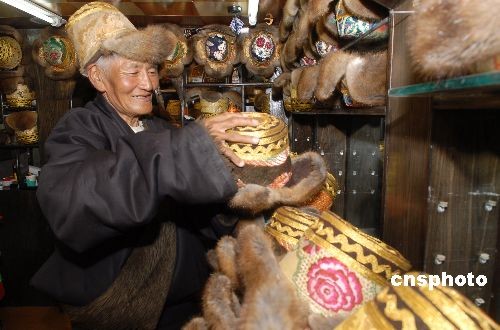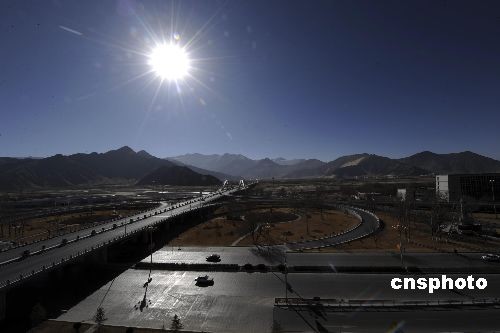Over the past five decades, there have been huge political, economic and cultural changes in Tibet. But older Tibetans are still haunted by painful memories of the old, feudal society.
 |
|
The Tibetan New Year is on the way. On February 22, this 65-year-old Tibetan was choosing a new hat in a shop in Lhasa. Present living conditions in Tibet allow more and more people to enjoy comfortable lives well in to their old age. |
Before the democratic reforms of 1959, Tibetan society was a system of feudal serfdom in which religion and politics were fused in a dictatorship of monks and aristocrats.
"Snow Prison", built by the fifth Dalai Lama under the Potala Palace, and Langzixia Prison, not far from Johkang Monastery, were two of the most notorious places in Lhasa at that time. Unspeakable tortures were carried out at both places, including gouging out eyes, cutting off hands and feet, and peeling off skin.
Standing in front of "Snow Prison", Dob Gyal, a 63 years old Tibetan said, "The old Tibet didn't leave me with any good memories at all."
In an attempt to preserve the feudal system and the privileges associated with it, the upper-class dominated local government of Tibet launched an armed rebellion on March 10, 1959 under the banner of "Tibetan independence."
The rebellion was quickly put down and on March 28, 1959, the central government dissolved the local Tibetan government and transferred its powers to the Preparatory Committee for the Tibet Autonomous Region. Simultaneously the government launched social reforms that abolished the feudal system and emancipated millions of serfs.
But even today, most elderly Tibetans can still remember the bad old days. The 74-year-old Yixiluozhui recalled, "50 years ago I was a serf, and because my family was poor, they sent me to Drepung Monastery to be a servant of the Grand Lama. I was beaten almost every day. Life was very tough."
In old Tibet, it was better for people not to get sick, because there were no proper hospitals or clinics. If you got ill, the only course of action was to visit a Lama to ask for a blessing. "Visiting a Lama for a cure was equivalent to waiting to die," said Dob Gyal.
With little or no medical care available, average life expectancy in old Tibet was 36 years. Today, life expectancy has risen to 67, and the population of Tibet has grown from 1.22 million in 1959 to 2.8 million.
While in the past people went to temples seeking a cure, now Lamas attend hospital for treatment. The monks of Drepung Monastery have medical insurance like people from all other provinces of China.
To commemorate the emancipation of the serfs in 1959, Tibetan lawmakers instituted March 28 every year as Serfs Emancipation Day.
Pubuciren, a young Tibetan said, "Serf Emancipation Day was the most important day of my parents' life, because it was as if they were reborn that day. They were not serfs any more and they could look forward to a life of their own."
Over the past five decades, there have been huge political, economic and cultural changes in Tibet. Former serfs have become masters of the new socialist Tibet and the region is looking forward to a better and brighter future.
 |
|
The overpass from the Lhasa downtown area to Lhasa Train Station symbolizes the progress made in road construction in recent years in Tibet. The region had 48,611 km of roads in 2007 compared to 15,852 km in 1978. |
(China.org.cn by Ma Yujia, February 24, 2009)